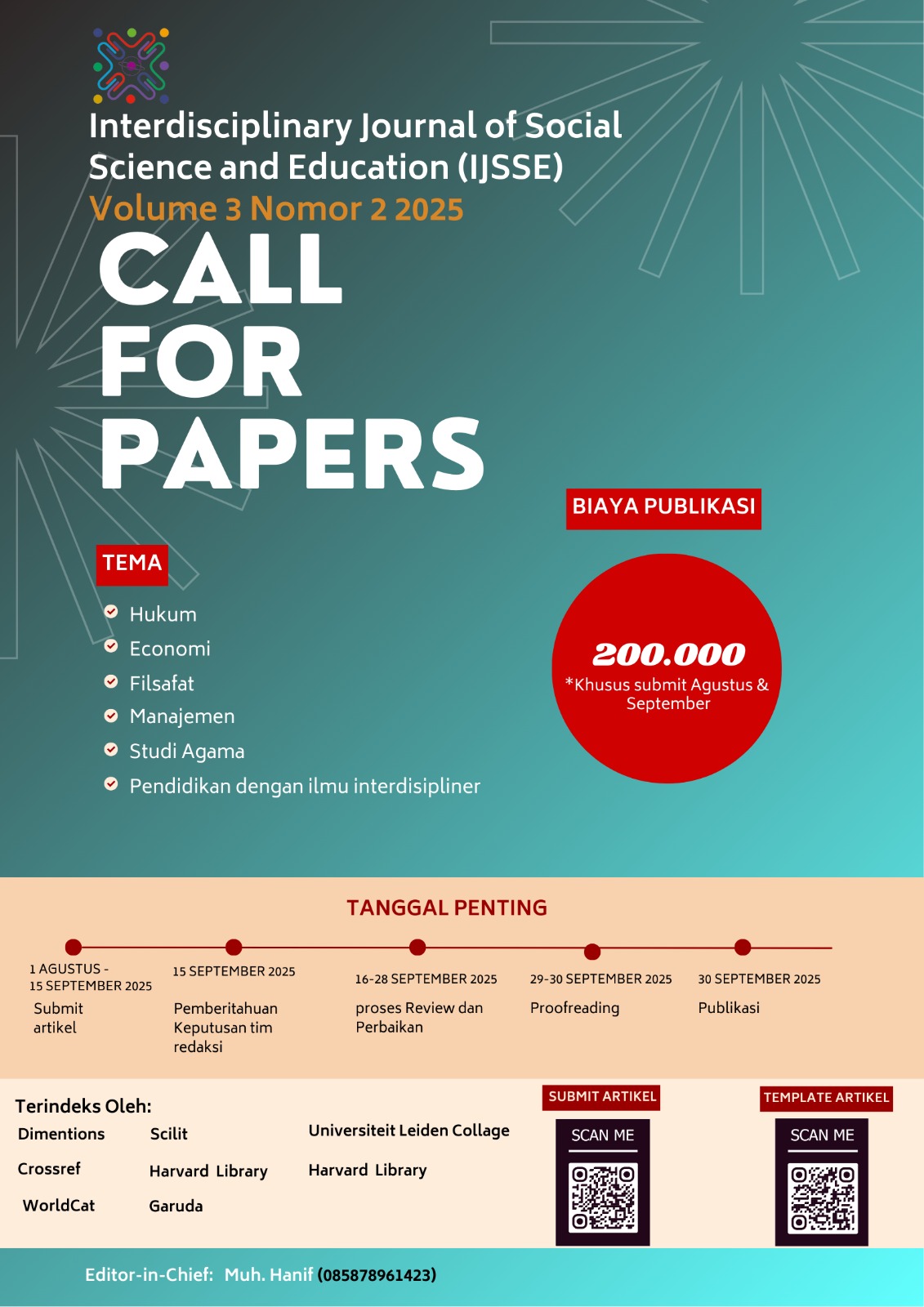The State, Religion, and Social Media: A Critical Review of Islamic Counseling Policy in Indonesia
DOI:
https://doi.org/10.53639/ijsse.v3i1.71Keywords:
Transformation, Digitalization, Opportunity, ChallengeAbstract
Advances in information technology, particularly the internet and social media, have significantly changed communication and interaction within society. The ease of accessing information has made the global community resemble a global village. Digital technology has both positive and negative impacts that must be addressed wisely. Religious counsellors, as the frontline of the Ministry of Religion, are required to transform. Directorate General of Islamic Education Decision No. 1172 of 2024 provides guidelines for the implementation of religious counselling on social media. This study explores the opportunities, challenges, and alternative solutions for the implementation of the aforementioned decision. Using a descriptive quantitative research method, it can be concluded that religious counsellors must transform themselves to be willing and able to use social media for preaching and counselling. The role of digital technology brings benefits in various aspects, including religious counselling; however, social media must be used wisely so that religious counselling can run smoothly and provide benefits to society at large
Downloads
References
Abdul Karim, Dakwah Melalui Media: Sebuah Tantangan dan Peluang, At-Tabsyir, Jurnal Komunikasi Penyiaran Islam, Vol. 4 No. 1. Juni 2016.
Abdul Rahman, Tantangan dan Peluang Penyuluh Agama di Era Digital, Jurnal Kajian dan Dakwah dan Kemasyarakatan, http://journal.UINJKT.ac.id/index.php/dakwah 25 (1), 2021.
Abidin Zainal, Yusuf, Pengantar Sistem Sosial di Indonesia, Bandung: Pustaka Setia, 2013.
https://mediaindonesia.com/humaniora/753354/manfaat-media-sosial-positif-dan-negatifnya.
https://www.rri.co.id/iptek/721570/ini-data-statistik-penggunaan-media -sosial-masyarakat-Indonesia-tahun-2024,
Ivani Puji Safitri dan Muhammad Rifa’I, Implementasis Infografis di Media Sosial Sebagai Sarana Layanan Bimbingan Penyuluhan Islam. Counceling As-Syamil, vol 04, no 1, 2024, hal. 32-43. E-ISSN:2808-7151. P-ISSN:2808-7445.
Keputusan Dirjend Bimas Islam no. 1172 tahun 2024 tentang Petunjuk Pelaksanaan Penyuluhan Agama Islam di Media Sosial.
Peraturan Menteri Pemberdayaan Aparatur Negara dan Reformasi Birokrasi RI. No. 9 tahun 2021 tentang Jabatan Fungsional Penyuluh Agama.
Putri Andriyana dan Bob Andrian, Agama, Media dan Masyarakat di Era Digital, Borneo, Journal of Islamic Studies, Vol. 4. No. 2 Jan-Jun 2024.
Rokhman, F., & Pristiwati, R. (2023). Dari Dunia Offline ke Dunia Online: Merangkul Literasi Digital. Jurnal Pembahsi (Pembelajaran Bahasa Dan Sastra Indonesia), 13(1), 44–54.
Surat Edaran Menteri Agama No SE. 2 tahun 2024 tentang Pelaksanaan tugas Penyuluh Agama dan Penghulu dalam mendukung Program Prioritas Pemerintah.
Susari, , H., Pendidikan Agama Islam dalam Perspektif MUltikulturalisme (Studi Kasus di SMAN 8 Kota Tangerang), Ciputat Timur: Young Pregressive Muslim, 2012.
Wahyu, Ramdani, Ilmu Sosial Dasar, Bandung: Pustaka Setia, 2017.
Downloads
Published
How to Cite
Issue
Section
License
Copyright (c) 2025 Lili Hidayati

This work is licensed under a Creative Commons Attribution-ShareAlike 4.0 International License.
Authors who publish with this journal agree to the following terms:
- Authors retain copyright and grant the journal right of first publication with the work simultaneously licensed under a Creative Commons Attribution License that allows others to share the work with an acknowledgement of the work's authorship and initial publication in this journal.
- Authors are able to enter into separate, additional contractual arrangements for the non-exclusive distribution of the journal's published version of the work (e.g., post it to an institutional repository or publish it in a book), with an acknowledgement of its initial publication in this journal.
- Authors are permitted and encouraged to post their work online (e.g., in institutional repositories or on their website) prior to and during the submission process, as it can lead to productive exchanges, as well as earlier and greater citation of published work (See The Effect of Open Access).


















